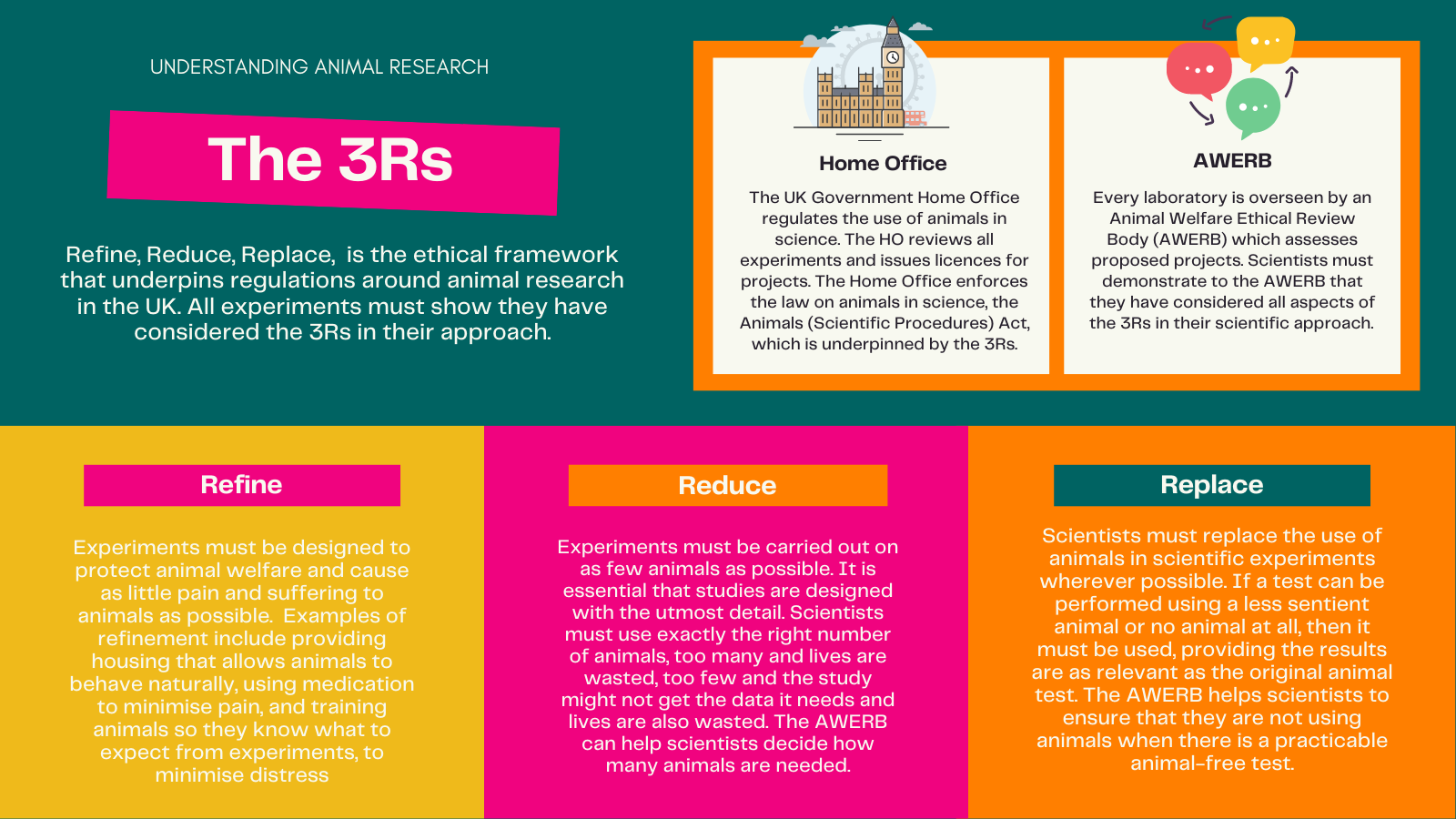IB Syllabus focus:
'- Historical treatment of animals
- Modern ethical guidelines
- Controversies and debates'
Animal studies have significantly contributed to our understanding of human behaviour, psychology, and biology. However, using animals for research, especially in psychology, has prompted numerous ethical concerns, debates, and guidelines to ensure their humane treatment. This section will delve into the historical treatment of animals in research, the evolution of modern ethical guidelines, and the ongoing controversies and debates surrounding this sensitive issue.
Historical Treatment of Animals
Early Research Practices: In the early days of scientific experimentation, there was minimal concern for the welfare of animals. They were frequently subjected to painful procedures, deprived environments, and extreme conditions to observe their behavioural responses.
Notable Examples:
Ivan Pavlov: While his work on classical conditioning is foundational, Pavlov's methods, like surgically implanting devices in dogs, raised concerns. A related exploration can be seen in Skinner's experiments with rats, which you can read about here.

A contemporary diagram of Pavlov’s conditioned-reflex experiment shows a restrained dog with a salivary fistula and collection apparatus, exemplifying invasive methods typical of early research. The setup helps contextualise why modern ethical frameworks now prioritise analgesia, refinement, and welfare safeguards. Source.
John Watson: Known for the "Little Albert" experiment, Watson also conducted invasive animal experiments to study instinctual behaviours.
Shift in Perception: As societies became more concerned with animal rights and welfare, a change in perspective towards their ethical treatment in research settings started to emerge by the mid-20th century.
Modern Ethical Guidelines
The Three Rs Principle
Replacement: This involves using alternative methods that do not require animals. For example, in silico (computer-based) or in vitro (cell culture) methods.
Reduction: If animals are essential, researchers should aim to use the fewest animals possible to obtain valid results, ensuring minimal suffering.
Refinement: Improving experimental techniques to minimise potential pain, suffering, distress, or lasting harm to animals. This includes considering the right to withdraw, a fundamental ethical concern detailed here.

A concise infographic defines the Three Rs—Replacement, Reduction, and Refinement—and positions them as the core framework guiding ethical animal research. This visual reinforces terminology and contrasts among the Rs without extraneous detail. Source.
Institutional Review Boards
Role and Function: Many institutions have review boards or ethics committees to evaluate the ethicality of proposed animal research. These boards ensure compliance with local and international guidelines.

The Institutional Animal Care and Use Committee (IACUC) review flowchart summarises protocol submission, pre-review, designated-member or full-committee pathways, final decisions, and post-review checks. Visualising these steps clarifies how institutional oversight protects animal welfare and enforces regulations. Source.
Enforcement: Non-adherence to these guidelines can lead to severe penalties, including loss of funding or the authority to conduct research.
Legal Frameworks and Organisational Policies
Governmental Oversight: Numerous countries have legal frameworks to govern animal research. These might dictate the conditions in which animals are kept, the type of research permitted, and the methods employed.
Organisational Policies: International organisations, like the World Health Organisation (WHO) and the European Commission, have laid down policies regarding animal testing, promoting more humane practices.
Controversies and Debates
Utility vs. Ethicality
Value of Animal Research: Advocates argue that animal research has led to numerous scientific breakthroughs, benefiting both human and animal health. For instance, the development of certain medicines, treatments, and surgical techniques. Twin studies, another form of research, provide insights into the nature vs. nurture debate, as discussed here.
Counter-arguments: Detractors believe that the benefits do not justify the means, especially when considering the potential pain and suffering of animals. They often push for alternative methods.
Cognitive and Emotional Capacities of Animals
Brain and Behaviour: Recent research has indicated that many animals, especially mammals, have cognitive and emotional capacities that are more sophisticated than previously believed. This recognition has fuelled debates over their use in experiments. The concept of neuroplasticity, which demonstrates animals' and humans' ability to adapt and learn, adds depth to this discussion and can be explored further here.
Speciesism Accusations: Some argue that giving preference to humans over animals is a form of discrimination known as speciesism. They advocate for more equitable treatment, regardless of species.
Transparency in Research
Need for Transparency: Critics of animal research often point out that institutions are not transparent enough about their animal research practices. They demand more openness about the methodologies used and the outcomes of these experiments.
Reproducibility Crisis: Recent years have seen concerns about the reproducibility of many scientific studies, including those using animals. If results cannot be replicated, it brings into question the necessity of the original research and the ethical justification for using animals.
Balancing Welfare with Scientific Advancement
Welfare-first Approach: Some believe that while animal research may be permissible, the welfare of the animals should always come first. They argue for a more compassionate approach to research, even if it means slower scientific progress. Essential to this approach is using rigorous sampling techniques to ensure research validity and minimise animal use, details of which can be found here.
Science-first Approach: Others maintain that while animal welfare is essential, it shouldn't hinder scientific progress. They argue that some short-term harm can lead to long-term benefits for both humans and animals.
In conclusion, the ethical considerations surrounding the use of animals in psychological research are multifaceted. As our understanding of animal cognition and emotion evolves, so too does the ethical landscape, requiring ongoing reflection and adjustment by the scientific community.
FAQ
Ethical standards for animal research are usually enforced through institutional review boards or ethics committees. These entities review proposed animal experiments to ensure they adhere to ethical guidelines. Furthermore, many countries have governmental bodies that oversee animal research, establishing guidelines and conducting periodic reviews of research facilities. Non-compliance with ethical standards can lead to penalties, withdrawal of funding, or even the shutting down of research programmes.
Yes, many historical studies have faced criticism for their treatment of animals. One notorious example is Harry Harlow's research on maternal deprivation with rhesus monkeys in the 1950s and 1960s. Harlow separated infant monkeys from their mothers and observed the severe psychological and behavioural disturbances that resulted. Though the studies provided essential insights into the importance of maternal care, they have been heavily criticised for causing undue suffering to the animals.
Absolutely. With technological advancements, many alternatives have emerged. In silico techniques, such as computer simulations and virtual tissues, can replicate biological processes. In vitro methods, which involve studying biological properties outside of their natural context (e.g., cells studied in a petri dish), also provide alternatives. Human-based studies, like clinical trials and observational studies, are often preferred when applicable. The aim is always to reduce animal usage where possible, in line with the Replacement aspect of the Three Rs.
Yes, with the rise of ethical considerations and the development of alternative research methods, there has been a notable decline in the use of animals, particularly in procedures that might cause harm or distress. The emphasis on the Three Rs principle has further reduced the number of animals used in research. Institutions and funding bodies also now prioritise research methods that don't rely on animals, ensuring that their use is only as a last resort and with stringent ethical considerations.
Animals are often used in psychological research to understand fundamental biological and behavioural processes. Since humans and many animals share similar physiological systems, results from animal studies can provide insights that might be applicable to humans. Additionally, certain experiments may be deemed too dangerous or unethical to conduct on humans, making animals a more viable option. The controlled environment in which animals are studied allows for a higher degree of experimental precision, minimising variables that could confound results in human studies.
Practice Questions
The Three Rs principle stands for Replacement, Reduction, and Refinement. It was established to promote more humane experimental procedures involving animals. "Replacement" refers to the adoption of alternative methods that avoid using animals, such as computer simulations. "Reduction" aims to minimise the number of animals used in research, ensuring that the smallest number possible is used to obtain reliable results. Lastly, "Refinement" is about amending experimental techniques to reduce pain, suffering, and distress. The significance of the Three Rs lies in its commitment to advancing science without compromising animal welfare, serving as a cornerstone in modern ethical standards for animal research.
One major controversy surrounding animal studies in psychology pertains to the debate over benefits versus ethical costs. Proponents of animal research often highlight the critical insights and advancements in medical and psychological fields that have been achieved through such studies. They argue that these benefits to human health and well-being can sometimes justify the ethical costs. On the other hand, opponents contend that the moral and ethical implications of subjecting animals to potential harm, suffering, or death often outweigh any benefits derived. They advocate for alternative research methods and greater consideration of animal rights and welfare.

